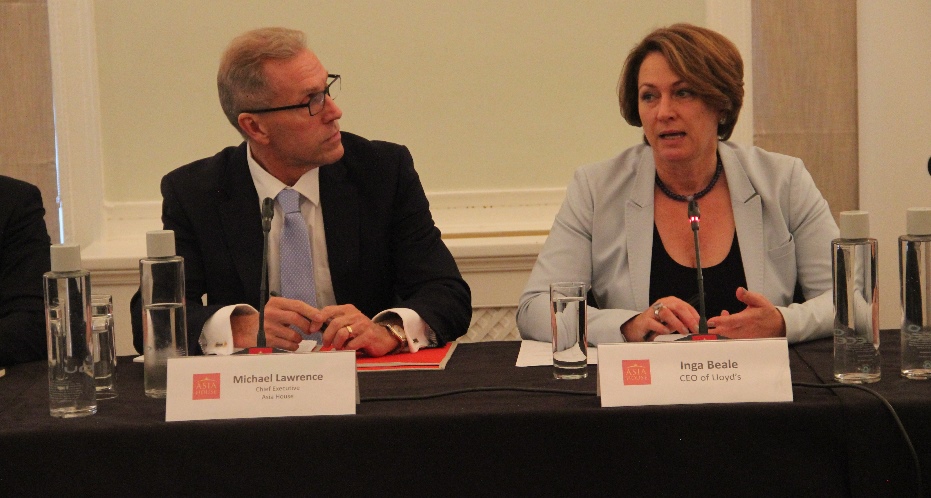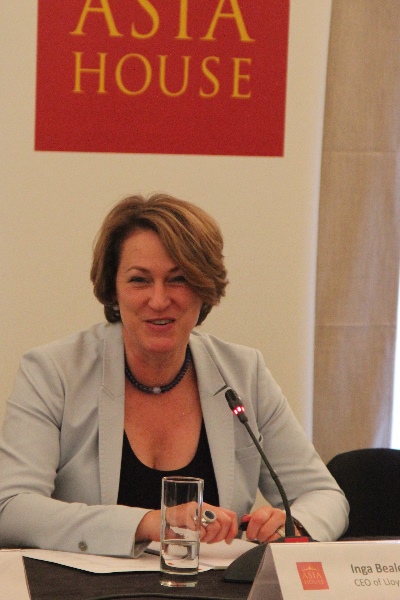Driving commercial and political engagement between Asia, the Middle East and Europe
Driving commercial and political engagement between Asia, the Middle East and Europe
Driving commercial and political engagement between Asia, the Middle East and Europe

Lloyd’s of London will lose four per cent of its business worth £900 million if the UK loses passporting rights when it exits the European Union (EU).
The world’s oldest insurance market is weighing up two options to ensure it retains that business: either to open up a subsidiary market in an EU country or to open up individual branches in 27 EU countries and apply for licences in each jurisdiction.
Lloyd’s plans to follow through with one of these options in the New Year, regardless of when Article 50 is triggered. Some of its London staff will have to be shifted to another EU location.
Lloyd’s CEO Inga Beale said 11 per cent of Lloyd’s revenues (£2.93bn) is generated from other EU countries and is written in the EU (outside the UK). Of that 11 per cent, seven per cent would not be affected by the loss of passporting rights, she said, because it is a very specialist element of business which Lloyd’s has the trading rights to do from London. But four per cent would be immediately lost, she said, as Lloyd’s would not be able to write that business in the rest of the EU once the UK exits the EU, if passporting rights are not retained.
“We would no longer be able to write that four per cent – worth nearly a billion euros – from London unless we continue to have passporting rights because to write insurance you have to be licensed,” she said in an interview with Asia House on Friday, 7 October ahead of a private briefing with corporate members.
“We don’t believe Brexit will impact the remaining 89 per cent of our business – that will continue to come through London.
“We will either have to set up a subsidiary in a remaining EU country where there are passporting rights – that’s one plan we are looking at – or we will have to set up individual branches in each country and negotiate licences with each regulator,” she said.
But the insurance market’s first female CEO said both options were complex and costly.
Lloyd’s would need separate licences for separate products and individual businesses operating in the insurance market all had different requirements, she said.
“There are 60 individual firms in our market. If you are a company you can move to one country and that is it but we need to set up a market subsidiary which brings additional complexities,” she explained.
Triggering Article 50
British prime minister Theresa May has said she will invoke Article 50 of the Lisbon Treaty, the legal mechanism for the withdrawal of a member state from the EU, by the end of March 2017.
“We are looking at both options, evaluating the costs and so on of each, and we may determine to start implementing one of these plans before Article 50 is triggered in the New Year as there is still uncertainty as to where the UK will end up,” Ms Beale said, though she stressed that until the UK actually exited the EU there would be “no impact on Lloyd’s.”
“Every policy issued up to the exit would be valid but past that we don’t know what the Government will aim to negotiate and what their plan is. We have had no clear signals yet that pushing for access to the single market is what the Government is going to focus on,” she added.
She said some staff from London would obviously have to relocate once the plans were implemented. Lloyd’s had campaigned to remain in the EU prior to the referendum.
“Several EU cities have been courting us,” she said. “They are trying to make themselves attractive for insurance and financial businesses to set up in.”
She would not specify which cities were courting Lloyd’s but said she was aware several London-based banks had been looking at Frankfurt.
“This will add costs to our business, not only the costs we are facing now, but we have already stopped some innovative work and redirected resources to looking into our options. There is one particular piece of work we have stopped doing to divert our resources,” she said, referring to the delayed launch of the much-anticipated Lloyd’s insurance index.

Lloyd’s CEO Inga Beale said the impact of Brexit on Lloyd’s was “manageable”
How much shifting some of its business to the EU would affect Lloyd’s contribution to the GDP of the City would “depend on how much we can repatriate in terms of profits,” Ms Beale said.
The London insurance market contributes more than 20 per cent of the City’s GDP and employs 48,000 people.
Lloyd’s is represented on a senior advisory committee – mainly made up of banks – which is lobbying the British Government about passporting rights, Ms Beale said. So far the 328–year-old insurance market had received no clear indication as to what direction the Government would take.
“There is no clear message yet as to whether that will be part of their negotiating stance but if we can retain passporting rights then we can continue to write all that business from London,” she said.
However she said Brexit’s impact on Lloyd’s was “not significant” as Lloyd’s generates more than 40 per cent of its revenues from its biggest market, America.
“Lloyd’s reputation is enormously strong and we insure a global portfolio. Our trading rights with America and Asia are not affected by Brexit. We have been doing this for many years so the rest of the business is not affected, which is great news so I would say the impact is not significant, it is manageable.”
London’s status as global centre for insurance under threat
However, she said London’s status as the global centre for insurance and reinsurance could be under threat if passporting rights are lost. The London insurance market controls more than £60 billion of gross written premium and about 16 per cent of London market premiums came from the EU in 2013.
“A lot of insurance firms, whether they are from Asia or America, have set up their access to Europe in London – and that is potentially under threat. Why would a new business set up in London now? There is uncertainty as to whether they could write any business other than UK business from London,” she said.
Such firms would, if passporting rights were lost, need to be in both the UK and the EU so “the future could look quite different,” she explained.
But she said that London had gained its reputation as the centre of insurance because of “the cluster effect around Lloyd’s.”
Ms Beale, who became the chief executive of Lloyd’s in 2014, said that that was one of the reasons why London might still be able keep its unique status.
“The talent in the London insurance market is unsurpassed because of the cluster impact. It’s a very physical trading floor. Billions of dollars of business is traded on it – and it’s all based on human interaction. It’s not a digital business. Other assets London has are its time zone, legal system and regulatory environment,” she said.
It’s a trusted environment in which to set up a business, she added, saying employment law was “reasonably favourable towards employers.”
If the British Government negotiates to retain passporting rights then Lloyd’s will be unaffected by Brexit, she said.
Pivot towards Asia
Lloyd’s currently has offices in Japan, China, Hong Kong and Singapore and Ms Beale said the core focus of Lloyd’s in Asia now was on India, China, Malaysia and Indonesia.
“Singapore is our second largest platform in the world and is a regional hub where we do our Southeast Asian business from. The third largest platform is China where we are doubling our revenues each year,” she said.
Lloyd’s opened a Liaison Office in South Korea last year. Whilst it currently writes Indian business on an offshore basis, it will open an onshore reinsurance branch in Mumbai next year and has applied for an onshore reinsurance licence in Malaysia.
“In India all the insurance is state-controlled and the Government is pushing individuals to buy more insurance and protect themselves,” Ms Beale said.
She said Lloyd’s was also very keen to enter Indonesia but was facing “a certain amount of protectionism which is not enabling us to do what we have done in other markets. There is too much regulation and they want to keep the risk in country. We thought it would open up but it hasn’t yet,” she said.
The interview took place before a private briefing and roundtable discussion with Asia House corporate members. Members represented at the table included Arup, Telstra, Prudential, Nikkei, DWF, KPMG, Zaiwalla & Co LLP, McKinsey & Company and DLA Piper.
naomi.canton@asiahouse.co.uk
The new Permanent Secretary for the Department for International Trade Sir Martin Donnelly will brief corporate members on 11 October on the current state of play of the new department that he has been brought in to set up and its collaboration with other Whitehall departments. For more information click here.
Asia House is holding a series of events to help members navigate the political and economic uncertainties surrounding Brexit. For more information on the Asia House Brexit Series click here.
To find out about becoming a corporate member of Asia House email Charlie.Humphreys@asiahouse.co.uk
